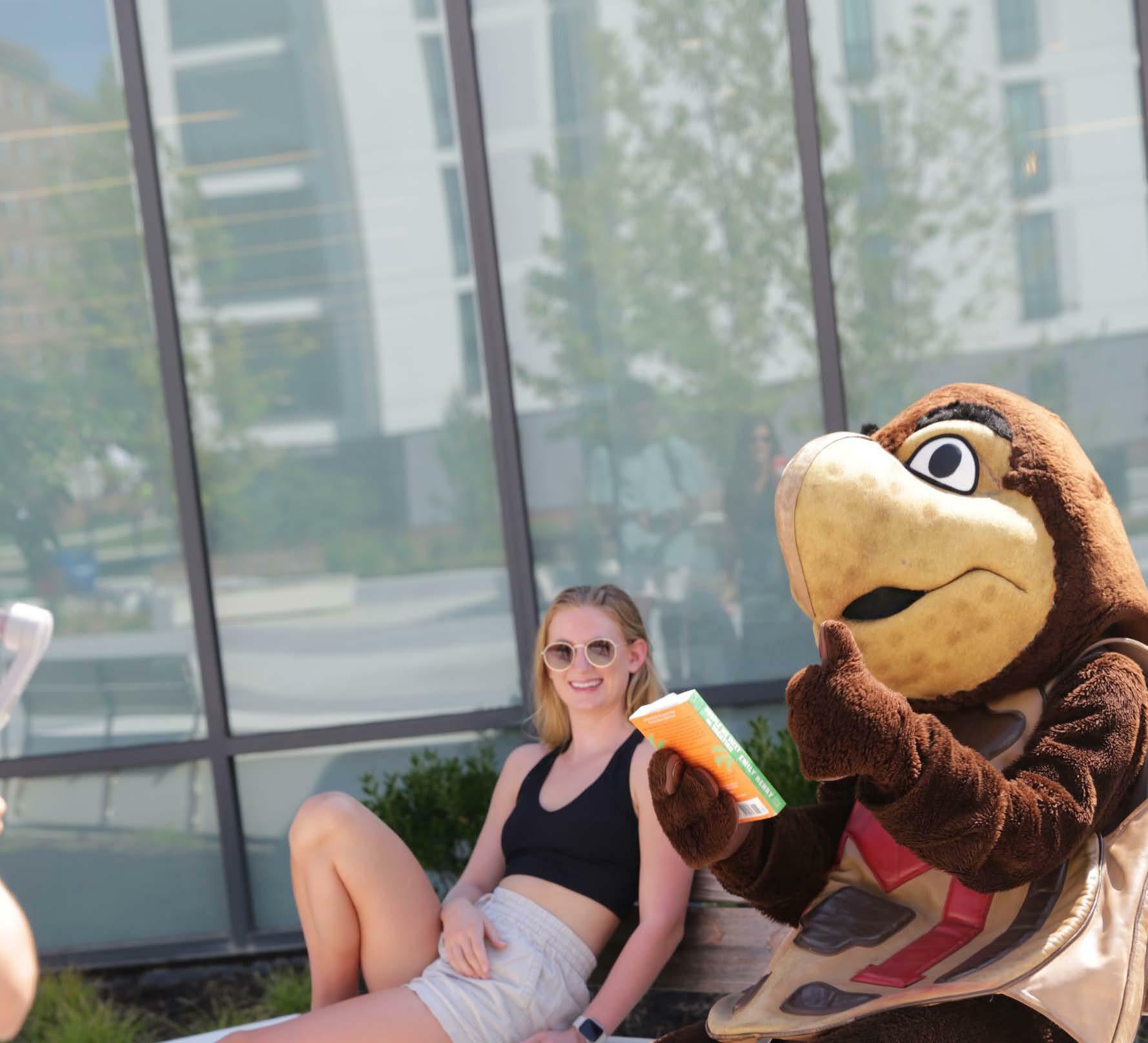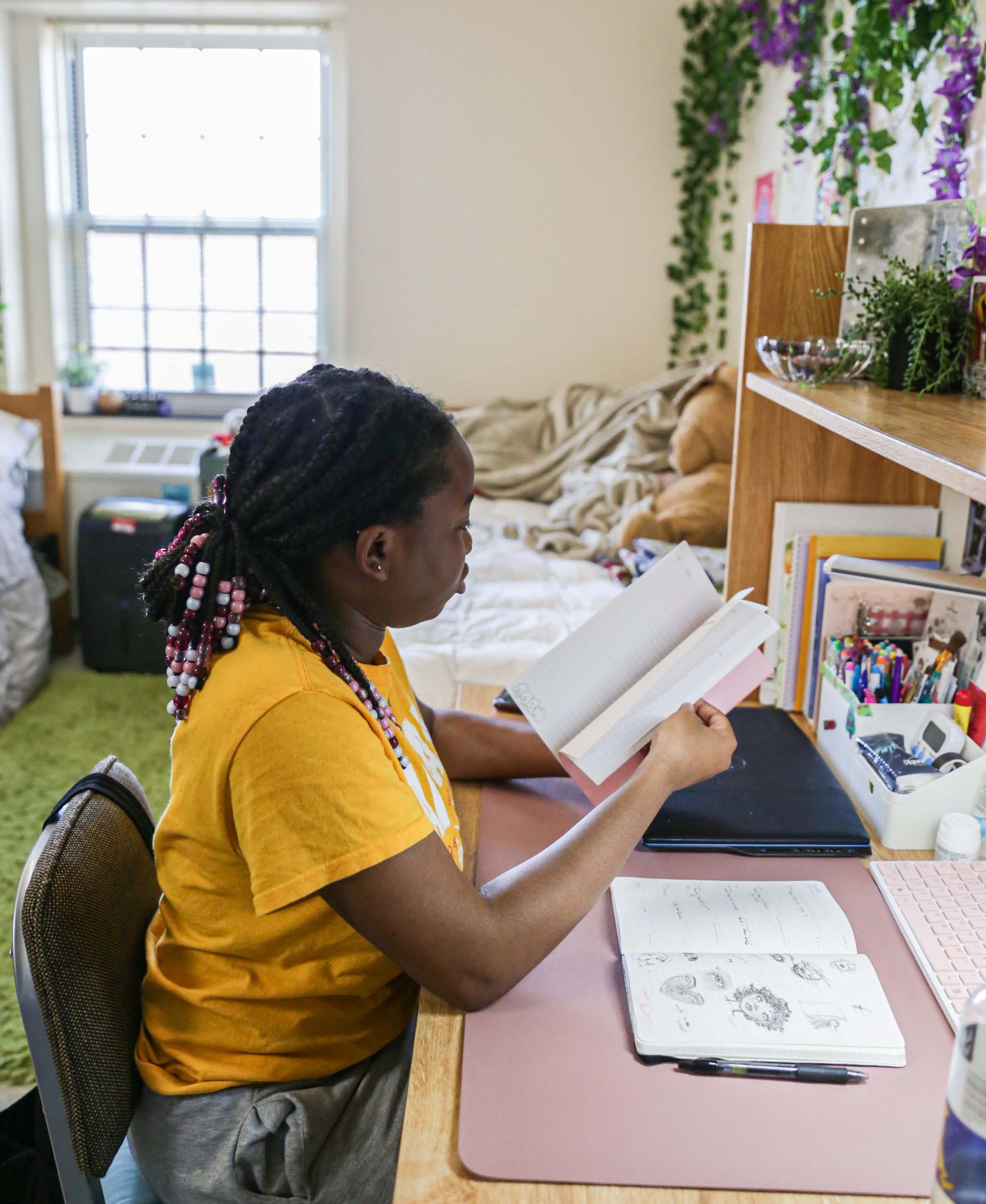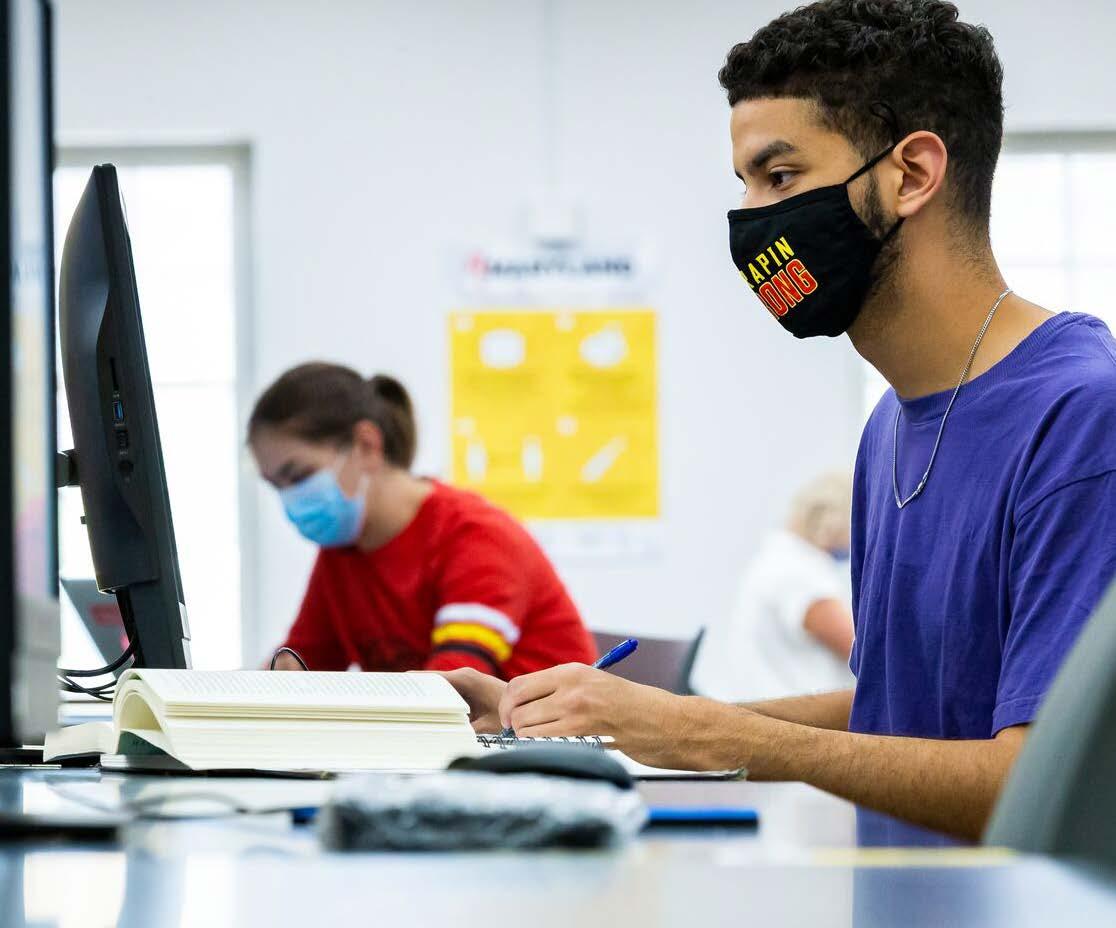ACADEMIC SUCCESS GUIDE
Dear Terp,

The fall semester is well underway. The new academic year brings new challenges both global and personal. All of these issues as well as individual struggles can have an impact on your academic journey here at UMD. The Department of Resident Life is here to support you along your educational path and wants you to know about the resources available to help you along the way.
Please explore the following resources and tips to help you succeed academically and prepare for any upcoming midterms and the rest of the semester. We are always here to help you succeed!
 RESIDENT LIFE | Fall 2022
RESIDENT LIFE | Fall 2022
1
Tips for Success

2
GET ORGANIZED & CREATE A STUDY PLAN
Now is the perfect time to assess your workload and make decisions about how to proceed through the fall semester in a way that will promote your academic success. By now, you should have attended all of your classes a few times and have an understanding of your course load difficulty as well as your professors expectations. Use this knowledge to:
1. Set up a schedule for studying and project completion.
Pro Tip: The University of Minnesota Libraries have an assignment calculator that can help you keep track of assignment deadlines and breakdown assignments into manageable pieces. Check out the Assignment Calculator.
2. Determine how and where you need to study for each course.
3. Decide how you will hold yourself accountable to your organizational goals.
TIPS TO GET ORGANIZED
Committing to an organized semester will help you to stay motivated, keep stress levels down, and accomplish more in a short period of time. Try out some of the following suggestions to get and stay organized:
• Set goals by month, week, and day that outline what you want to accomplish. Be specific!
Pro Tip: The Counseling Center has a worksheet that can help you think about how to develop and accomplish your goals. Use this worksheet to come up with your goals for the semester.
• Commit to specific studying times and hold yourself accountable. Building a routine is important. Commit to these times by adding them into your planner and/or calendar.
• Set up your study space in a way that is clean, free from distractions, uncluttered, and comfortable. Make sure you have plenty of light.
• Include all of your obligations on your digital calendar and ensure that you set alarms for items you might forget.
• Determine a daily or weekly time to ensure that all of your notes and course materials are present, organized, and complete. Update when and where it is necessary.
• Determine a daily or weekly time to ensure that your personal space is clean and tidy. Get rid of clutter and put everything in its designated spot. Choose one thing to deep clean each week (vacuuming counts as deep cleaning).
• Keep a “to do” list and add everything that you need to complete. This list does not need to have details, but should include everything you need to do. You can use a note in your phone, a physical notebook, your phone’s “Reminder” application, or the tool of your choice. As long as it is easily accessible and can hold a list, you are on the right track.
3
TIPS FOR CREATING A STUDY PLAN
You will not learn information through osmosis or last-minute cramming. Learning is a process that takes time, planning, and a good amount of effort. Creating a plan of attack for each of your courses, as well as for you as a whole student, is a great place to start the process of learning. For each of your courses, a study plan should include the following items:
• Expectations set by your professor. Did your professor mention that they do not want to see any spelling or grammar errors in your papers or they will take points off? Did they mention that you need to have read carefully before class for discussions? Do they require you to solve problems the way they do in class?
• A list of concepts that your professor will cover (get this from your syllabus).
• An overview of due dates and test dates, and when you plan to complete the work or study for the exam. Be realistic and plan ahead.
• A breakdown of the best ways to study and get work done for this course (e.g., doing practice problems, taking notes on the readings, creating and using flashcards, teaching others, reviewing past exams, using a test bank, attending a Guided Study Session, attending the Math Success Program, spending time in a lab, having a friend quiz you, etc.).
• A timeline for studying information that includes consistent time for review, even if there is not a test or assignment coming up. Add this to your master calendar.
• A location for studying. Try to get out of your room and use study spaces on campus. If you study in your room, avoid your bed!
Pro Tip: The Quiet Spaces Guide is a great place to start looking for alternative study spaces.
• How you will hold yourself accountable for carrying out your plan. Do you need to plan library trips with a friend? Will you join a study group?
4
This time of year may feel overwhelming or that you might be the only one struggling academically. Here are some words of encouragement to help carry you through those moments.


YOU’RE BRAVER THAN YOU BELIEVE, STRONGER THAN YOU SEEM, AND SMARTER THAN YOU THINK.”
-Christopher Robin, A. A. Milne
I DID THEN WHAT I KNEW HOW TO DO. NOW THAT I KNOW BETTER, I DO BETTER.”
-Maya Angelou
5
ASK QUESTIONS
College is an exciting time, but there may also be moments when you don’t know something or are unclear of the expectations. The best course of action is to ask questions. It is important to ask questions of people who can provide the most accurate answers. The best people may be your professors, TAs, academic advisors, an RA, or trusted student leaders that you know. It is perfectly okay to not know something or be unsure of how to proceed, but there are so many people who want to see you succeed and give you the best information.
Pro Tip: A great time to ask your professors any questions you may have is during office hours. Office hours are typically posted in your course syllabus. If you are unsure of when office hours are, email your professor to ask.
6
UPCOMING ACADEMIC SUCCESS EVENTS
October 11, 2022 | 2:00 p.m.
Don’t Let Time Manage You
ESJ 0201
This workshop offers strategies to plan and organize the best use of time.
Sponsored by the Teaching & Learning Transformation Center
October 19, 2022 | 11:30 a.m.
Guided Reflection Walk
Meet at the base of the ODK Fountain on McKeldin Mall
We will be doing a reflective walk to talk about how to be successful this semester.
Sponsored by the Department of Resident Life and the Teaching & Learning Transformation Center
7
RESOURCES
ACADEMIC SUCCESS & TUTORIAL SERVICES
As an initiative of the Academic Achievement Programs (AAP), the Academic Success and Tutorial Services program provides free peer tutoring to all UM students for over twenty 100- and 200-level general education courses. Additionally, tutoring is offered for historically difficult courses in areas such as biology, business, chemistry, computer science, economics, mathematics/ statistics, and physics.
THE COUNSELING CENTER
The Counseling Service in the Counseling Center is the primary campus provider of free and confidential therapy to help UMD students manage personal, social, and academic challenges. The Counseling Center also offers wellness workshops and a variety of resources to help students with common student concerns
GUIDED STUDY SESSIONS
The Guided Study Sessions (GSS) program offers FREE, regularly scheduled group review sessions for students in traditionally difficult courses. GSS Leaders have previously taken your course and earned an A, so they know what it takes to stay on track in lectures and prepare for exams. Go once, a few times, or attend every session—it’s never too late to start attending GSS.
For the Fall 2022 semester, some Guided Study Sessions will be conducted in-person and others will be conducted virtually through Zoom. To access a specific virtual session, please contact your GSS Leader or email gss@umd.edu from a University email address. Visit the GSS Program Website to view the available sessions.
KEYSTONE CENTER
Located in Patterson, the Keystone Center is a place where you can go to work on homework or group projects, use the computer labs, or study for exams. It will be staffed with upper-level undergraduate and graduate students who can provide you with assistance in answering questions in fundamental engineering and STEM courses: CHEM135, MATH140, MATH141, MATH241, and MATH246.
8
LIBRARIES
The University Libraries offer plenty of resources including those for getting started on research as well as places to study. There are six libraries on campus and all have different hours. Click here to learn more about the various libraries’ hours.
Bonus resource: Did you know that the University Libraries have a makerspace located in the STEM library? You can learn more about the offerings of the makerspace by visiting their website .
STUDENT LEARNING CONSULTATIONS
The Learning Specialist provides academic counseling to UMD students taking all levels of STEM courses. To schedule a time to meet with a Learning Specialist, please send an email from your UMD email account to learn@umd. edu or schedule an appointment here.
MATH SUCCESS PROGRAM
The Math Success Program offers free, drop-in math coaching and tutoring services for all UMD undergraduate students. The program is open SundayThursday from 6:00 p.m. - 9:00 p.m. Sundays are virtual, and Mondays through Thursdays are held in ESJ 0224. Visit the Math Success Program website to get more information and access the program.
MATH TEST BANK
Google Drive of past exams from the Math Department for tons of classes. Great practice material for studying for final exams.
9
RESOURCES
OFFICE OF MULTI-ETHNIC STUDENT EDUCATION (OMSE)
OMSE offers free, walk-in tutorial programs that cover most key courses in Writing, Mathematics, Biology, Chemistry, and Economics, among other courses. Individual and small group tutoring consisting of 2-4 students per group is available each semester in most undergraduate courses. Check out the OMSE tutoring schedule to see if your course is available. You can also check out these short videos created by OMSE tutors on some traditionally difficult concepts.
ORAL COMMUNICATIONS CENTER (OCC)
The OCC can provide: peer consulting for presentations, speeches, and other modes of oral communication; Speech planning and practice assistance; Interactive workshops on a variety of relevant communication skills; Special events and workshop series. You can schedule an appointment using online scheduling system
QUIET STUDY SPACES
These spaces offer some great opportunities to safely explore campus and find new places to get your work done. Please visit the Quiet Study Spaces list to view the spaces that are available, as well as the guidelines around using the spaces.
Bonus tip: Keep track of academic deadlines and other important academic opportunities by downloading the Academic Success Calendar.
Some of this content has been adapted from various sources including but not limited to The Teaching and Learning Transformation Center, The Counseling Center, and The UMD Keep Learning website .
10
SPS TUTORING
The Society of Physics Students (SPS) offers a free online and in-person tutoring program for anyone taking an introductory physics course at UMD. Tutoring is available on a drop-in basis through Zoom from 4-6pm, Monday through Thursday. It is also available in Toll 1303 at the same time. In order to request the Zoom information, students must fill out the brief form
TUTORING & ACADEMIC SUCCESS RESOURCES
The University is committed to academic excellence, and provides a variety of tutoring and other academic resources to support student success -- available on campus, from our peer institutions, and other non-university websites. To learn more about the available resources, visit tutoring.umd.edu . Also checkout these helpful resources to tackle some common academic concerns.
THE WRITING CENTER
The Writing Center provides opportunities for UMD’s diverse undergraduate student body to improve their writing, research, and critical thinking skills in preparation for successful academic, professional, and civic lives. In a supportive atmosphere, trained consultants from a variety of backgrounds and majors assist writers in-person and online throughout the writing process. Visit the Writing Center’s website to schedule an appointment.
Bonus tip: Did you know that you can check out different types of equipment from the Terrapin Learning Commons? You can check out projectors to yoga mats as well as calculators and other study materials. More information is available on the Terrapin Learning Commons website .
11
Good luck on midterms, Terps!
Study hard, go to class, get enough sleep and ask for help when needed.
You’ve got this!

